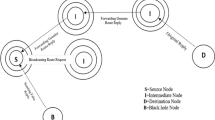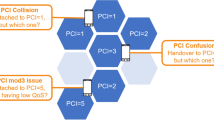Abstract
In order to allow truly spontaneous and infrastructureless networking, autoconfiguration algorithm is needed in the practical usage of most mobile ad hoc networks (MANETs). This paper presents spanning-tree based autoconfiguration for mobile ad hoc networks, a novel approach for the efficient distributed address autoconfiguration. With the help of the spanning tree, the proposed scheme attempts to distribute address resources as balanced as possible at the first beginning. Since each node holds a block of free addresses, a newly joining node can obtain a free address almost immediately. Subnet partitioning and merging are well supported. Finally, analysis and simulation demonstrate that our algorithm outperforms the existing approaches in terms of both communication overhead and configuration latency.
Similar content being viewed by others
References
Weniger, K., & Martina, Z. (2004). Mobile ad hoc networks—current approaches and future directions. In Proceedings of the IEEE network, Karlsruhe University, Germany.
Günes, M., & Reibel, J. (2002). An IP address configuration algorithm for zeroconf mobile multihop ad hoc networks. In Proc. Int’l. wksp. broadband wireless ad hoc networks and services, Sophia Antipolis, France.
Nesargi, S., & Prakash, R. (2002). MANETconf: Configuration of hosts in a mobile ad hoc network. In Proceedings of the IEEE INFOCOM 2002, New York, NY.
Boleng, J. (2002). Efficient network layer addressing for mobile ad hoc networks. In Proc. int’l. conf. wireless networks (pp. 271–277) Las Vegas, NV.
Zhou, H., Ni, L. M., & Mutka, M. W. (2003). Prophet address allocation for large scale manets. In Proceedings of the IEEE INFOCOM 2003, San Francisco, CA.
Mohsin, M., & Prakash, R. (2002). IP address assignment in a mobile ad hoc network. In Proceedings of the IEEE MILCOM 2002, Anaheim, CA.
Tayal A.P., Patnaik L.M. (2004). An address assignment for the automatic configuration of mobile ad hoc networks. Personal Ubiquitous Computer 8(1): 47–54
Perkins, C., et al. (2001). IP address autoconfiguration for ad hoc networks. IETF draft.
Vaidya, N. H. (2002). Weak duplicate address detection in mobile ad hoc networks. In Proceedings of the ACM mobiHoc 2002 (pp. 206–216) Lausanne, Switzerland.
Weniger, K. (2003). Passive duplicate address detection in mobile ad hoc networks. In Proceedings of the IEEE WCNC 2003, New Orleans, LA.
Sun, Y., & Belding-Royer, E. M. (2003). Dynamic address configuration in mobile ad hoc networks. UCSB tech. rep. 2003-11, Santa Barbara, CA.
Weniger, K. (2005). PACMAN: Passive autoconfiguration for mobile ad hoc networks. IEEE JSAC, Special Issue on Wireless Ad Hoc Networks.
Narten, T., Nordmark, E., & Simpson, W. (1998). Neighbor discovery for IP version 6. IETF RFC 2461.
Barr, R. (2004). JiST-Java in simulation time: User guide and tutorial.
Hinden, R., & Haberman, B. (2005). Unique local IPv6 unicast addresses. draft-ietf-ipv6-unique-local-ADDR-09.txt.
Broch, J., Maltz, D., Johnson, D., Hu, Y., & Jetcheva, J. (1998). A performance comparison of multi-hop wireless ad hoc routing protocols. In Proceedings of the 4th annual ACM/IEEE inter-national conference on mobile computing and networking, pp. 85–97.
Author information
Authors and Affiliations
Corresponding author
Rights and permissions
About this article
Cite this article
Li, L., Cai, Y. & Xu, X. Spanning-tree based autoconfiguration for mobile ad hoc networks. Wireless Pers Commun 43, 1465–1477 (2007). https://doi.org/10.1007/s11277-007-9320-1
Received:
Accepted:
Published:
Issue Date:
DOI: https://doi.org/10.1007/s11277-007-9320-1




